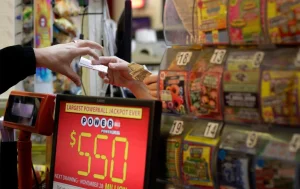The Psychology of Jackpot Chasers

Whether they’re buying lottery tickets on a whim, or chasing the big jackpot, gamblers often make mistakes that lead to a gambling addiction. It’s important to understand how the psychology behind lottery betting affects you and your decisions, so you can make informed choices about when and where to play.

Uncertainty
Uncertainty in life is not always bad, and it can help you learn to cope better with change. It can also help you develop a stronger sense of self-worth and resiliency.
There are many ways to deal with uncertainty, including learning to adapt and letting go of negative behaviors. By adjusting your mindset, you can learn to focus on the positive outcomes and less on the unexpected.
Scientists use the term uncertainty to describe the difference between measurements and the actual value of a quantity, which can vary due to errors and natural variation. In the late 1800s, Karl Pearson was the first to suggest that this variability is not caused by instrument or human error, but rather by natural variation in the measurement process itself.
There are three types of uncertainty: detection, measurement and ontological uncertainty (semantic or interpretational). Detection uncertainty includes errors in measuring devices, documentation errors, and model uncertainty when the exact values of input parameters are unsure. Measurement uncertainty includes errors in measuring and interpreting data, such as if the underlying probability distribution of the information is not known.
Expectations
There’s no denying that the lottery has long been a popular pastime for Americans. When the jackpot hits a certain level, people start to get excited and buy lottery tickets in droves.
One of the reasons for this is that they’re looking to win a big jackpot – and there’s nothing like a sizable payoff to bring a smile to the face. The best part is that it’s a lot less expensive than you might think, making the jackpot more accessible for those who are willing to gamble on their luck of the draw.
The psychology of winning the jackpot is quite complex, as is the actual monetary prize, but a little planning and forethought can go a long way to help you keep your chin up during what might otherwise be a stressful experience. It’s also worth examining what you really expect from your winnings, and whether or not they are actually going to boost your life quality and happiness levels.
Motivation
Motivation is the force that initiates, guides, and maintains goal-oriented behaviors. It involves biological, emotional, social, and cognitive forces.
There are two main types of motivation: intrinsic and extrinsic. Intrinsic motivation is driven by satisfying internal rewards. These reward a person for following their personal values, interests, or passions.
It may also be fueled by a sense of achievement. This type of motivation propels people to feel worthy when they achieve their goals, whether it’s getting a promotion at work or writing their name in the history books.
This is often achieved by providing the runner with rewards and incentives for reaching their goal. For example, a lottery ticket may offer a bonus for winning the jackpot.
Addiction
Addiction is a complex disorder that affects a person’s brain and body. It disrupts regions of the brain that are responsible for reward, motivation, learning, judgment and memory.
People who are addicted may continue to use drugs despite the harmful consequences of their behavior, including negative effects on their physical and mental health, relationships, work, finances and safety. Even relatively moderate drug use can be dangerous, leading to problems such as impaired driving and overdose.
In addiction, the brain’s reward circuit is overloaded. This results in changes in the prefrontal cortex, which is home to the brain’s highest functions.
There are many ways to treat an addiction, depending on the severity and type of disorder. Recovery involves self-guided or clinical-based approaches and the commitment of the patient to change. Treatment also depends on the patient’s readiness to seek help and support from family, friends and others. Relapse is common, but most people who have a substance use disorder achieve recovery.








